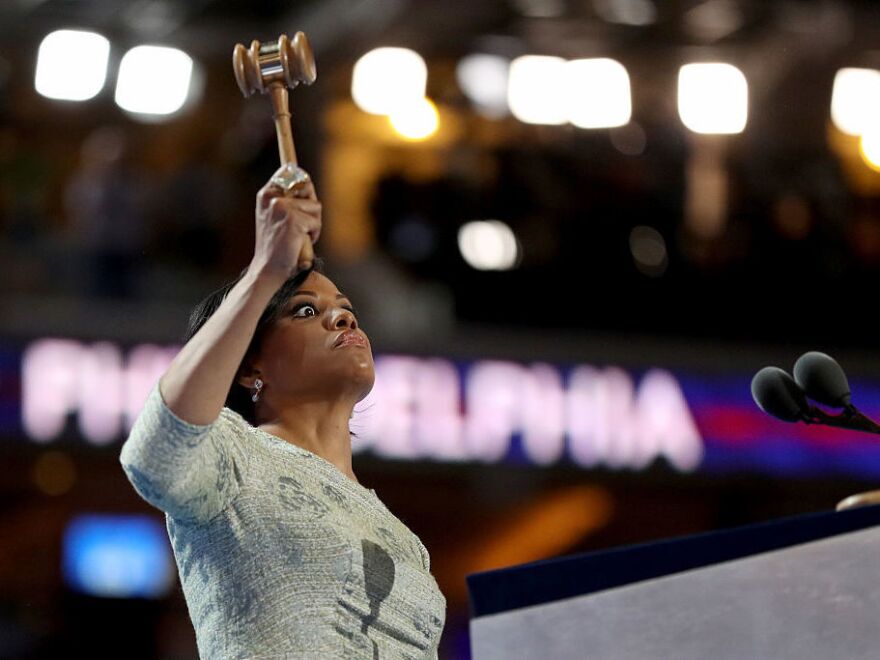Hillary Clinton will break the penultimate glass ceiling this week — becoming the first female nominee of a major American political party.
It's a historic milestone that's been obscured by Donald Trump's chaotic convention and, now, on the eve of the Democratic convention, the resignation of the DNC chairman following the leak of 20,000 emails showing that the DNC had its thumb on the scale for Clinton. The Clinton campaign blames the leak on Russia, which they say is trying to put its thumb on the scales for Trump.

Whew!
Here are five things to watch in Philadelphia this week:
How unified will the Democrats be?
The Wikileaks email dump threatened to upend the careful truce worked out between the Bernie Sanders camp and the Clinton campaign. But it has led to a huge victory for Sanders. He got Debbie Wasserman Schultz's head on a platter. Sanders has had a terrible relationship with Schultz. He even endorsed her primary opponent. Did Schultz's resignation satisfy the Sanders forces? Or will they have a demonstration or a walkout on the floor of the convention, presenting an image of a party almost as divided as the GOP? The answer may come Monday night when Sanders addresses the convention. Will he wholeheartedly and enthusiastically back Clinton? If he does, that will go a long way to unifying the party.
Will Democrats succeed in making the contrast with the GOP?
Donald Trump's divided and divisive convention set up a big fat target for the Clinton campaign. In addition to showcasing their (relative) unity, the Democrats are also planning a program that is optimistic, uplifting and inclusive. If Donald Trump is selling strength, Hillary Clinton will be selling steadiness in uncertain times.
But there's one part of the contrast that will be tricky to make. Watch how Democrats handle change versus the status quo. Clinton is an insider running in a outsider year.
She is the status quo candidate at a time when a lot of voters want change — even unpredictable change. Watch how she and President Obama make the case for continuity — for what is essentially "Chapter Two" of the Clinton/Obama agenda.
Can Clinton make voters see her as more honest? More likable?
Hillary Clinton is the most unpopular candidate to ever run for president — other than Donald Trump. To change that, the Democrats will have to provide a contrast to the GOP hate fest, and Clinton will have to present a positive case for herself and her agenda. This is Clinton's big challenge.
She comes into the convention with a majority of voters saying she is not honest or trustworthy or likable. Her approval ratings have been on a steady decline ever since she left the State Department and became a politician again — and she's really been hurt by the FBI director's stinging assessment of her "extreme carelessness" in handling classified information.
She might not be able to reverse voters' views of her honesty, but she might be able to make herself more relatable with testimonials from President Obama and Bill Clinton and a speech of her own that shows she's warm and approachable — the way so many people say she is in small groups or one on one.
Can they put on a better show than the GOP?
Donald Trump promised a convention full of showbiz. But he didn't deliver. Sure there was his WWE entrance with the smoke machine and backlit silhouette, but there just weren't that many sports heroes or celebrities in Cleveland. The Democrats are determined to do better than Trump in the entertainment department. They've got Snoop Dogg, Katy Perry, Keisha, Lady Gaga, The Roots and Fergie. Then there are the political stars — President Obama, Michelle Obama, Elizabeth Warren and Bill Clinton.
Donald Trump is a one-man band, with few personal validators beyond his family, his employees and Chris Christie. Hillary Clinton has a whole chorus of democratic luminaries singing her praises.
Will Clinton get a bounce?
The average convention poll bounce for Democrats since 1964 is 6.8 percent; for Republicans, it has been 5.3 percent, according to Gallup. Sometimes a candidate gets no bounce at all. Romney didn't in 2012. But sometimes they get a big bounce. Bill Clinton did in 1992 — a whopping 16-point bump after his convention in 1992. In a year when both candidates are so intensely disliked, that seems unlikely — but even a little improvement in Clinton's image would help a lot.
Copyright 2021 NPR. To see more, visit https://www.npr.org.



